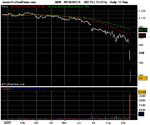Making Economic Sense
by Murray Rothbard
Chapter 78
Bank Crisis!
"..........Put more pointedly, why does this domino process affect only banks, and not real estate, publishing, oil, or any other industry that may get into trouble? Why are what Samuelson and other economists call "good" banks so all-fired vulnerable, and then in what sense are they really "good"?
The answer is that the "bad" banks are vulnerable to the familiar charges: they made reckless loans, or they overinvested in Brazilian bonds, or their managers were crooks. In any case, their poor loans put their assets into shaky shape or made them actually insolvent. The "good" banks committed none of these sins; their loans were sensible. And yet, they too, can fall to a run almost as readily as the bad banks. Clearly, the "good" banks are in reality only slightly less unsound than the bad ones.
There therefore must be something about all banks--commercial, savings, S&L, and credit union--which make them inherently unsound. And that something is very simple although almost never mentioned: fractional-reserve banking. All these forms of banks issue deposits that are contractually redeemable at par upon the demand of the depositor. Only if all the deposits were backed 100% by cash at all times (or, what is the equivalent nowadays, by a demand deposit of the bank at the Fed which is redeemable in cash on demand) can the banks fulfill these contractual obligations.
Instead of this sound, noninflationary policy of 100% reserves, all of these banks are both allowed and encouraged by government policy to keep reserves that are only a fraction of their deposits, ranging from 10% for commercial banks to only a couple of percent for the other banking forms.
This means that commercial banks inflate the money supply tenfold over their reserves a policy that results in our system of permanent inflation, periodic boom-bust cycles, and bank runs when the public begins to realize the inherent insolvency of the entire banking system.
That is why, unlike any other industry, the continued existence of the banking system rests so heavily on "public confidence," and why the Establishment feels it has to issue statements that it would have to admit privately were bald lies. It is also why economists and financial writers from all parts of the ideological spectrum rushed to say that the FDIC "had to" bail out all the depositors of the (insert bank), not just those who were "insured" up to (insert guarantee amount] per deposit account.
The [insurer] had to perform this bailout, everyone said, because "otherwise the financial system would collapse." That is, everyone would find out that the entire fractional-reserve system is held together by lies and smoke and mirrors, that is, by an Establishment con.......".
"...........Yes, the (BOE, Fed, ECB etc) could, in the last analysis, print all the cash and give it to the banks, under cover of some emergency decree or statute. But . . . there's a hitch. If it does so, this means that all the trillion or so dollars of bank deposits would be turned into cash. The problem, however, is that if the cash is redeposited in the banks, their reserves would increase by that hypothetical trillion, and the banks could then multiply new money immediately by ten-to-twenty trillion, depending upon their reserve requirements. And that, of course, would be unbelievably inflationary, and would hurl us immediately into 1923 German-style hyper-inflation. And that is why no one in the Establishment wants to discuss this ultimate fail-safe solution.
It is also why it would be far better to suffer a one-shot deflationary contraction of the fraudulent fractional-reserve banking system, and go back to a sound system of 100% reserves.
http://www.mises.org/econsense/ch78.asp
